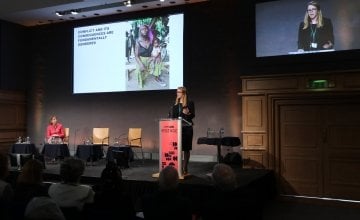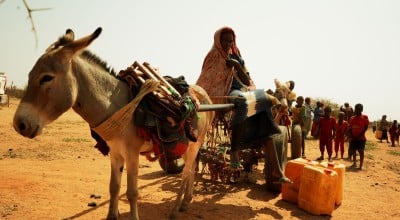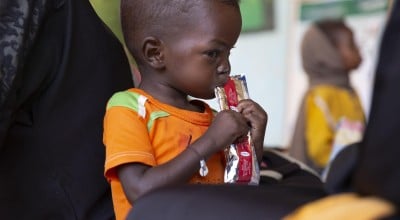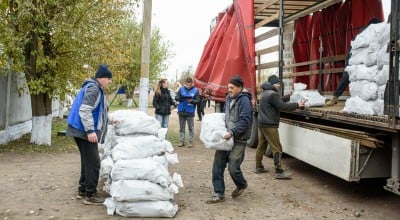
Read our 2024 annual report

Knowledge Hub
Ireland urged to champion UN pledge against use of starvation and famine as war tactics
Ireland is being urged to champion a landmark UN pledge against starvation and famine being used as weapons of war in a new international report published today by Concern Worldwide.
The country’s largest aid agency makes 20 key recommendations in the report titled, ‘Breaking the Cycle of Conflict, Hunger and Human Suffering,’ four of them directed at the Irish Government.

The world is on fire
Concern’s Chief Executive, Dominic MacSorley, said: “The world is on fire. Conflict is now the single greatest driver of humanitarian crises and is tearing apart the development gains of the late 20th Century.
“Ireland, as an experienced peace broker with its own history of war, famine and extreme poverty, can drive incremental change and help to reverse this humanitarian demise by taking a leading role in eradicating world hunger and becoming an even greater force for good in the world.”
The recommendations in the report include a call for Ireland to become a global leader and “champion” of UN Security Council Resolution 2417 (2018), adopted in May this year, condemning the starvation of civilians as a method of warfare as well as the unlawful denial of humanitarian access to civilian populations.
Concern's report states that conflict is today the key driver of acute food insecurity and that the Irish government should, in support of Resolution 2417, use the country’s reputation as a peacemaker to “actively coordinate with other UN member states dedicated to eradicating hunger to drive forward the incremental changes necessary to make progress.”
It calls upon the Irish government to triple its level of funding to peacebuilding and conflict prevention initiatives by 2030 with a focus on local and grassroots interventions.
The report also urges UN member countries to introduce a monitoring system to ensure there is no violation of UN Resolution 2417 and to hold all perpetrators to account.
Inaction is not an option
Mr MacSorley, added: “Conflict is the single greatest driver of humanitarian crises with over 68 million people forcibly-displaced and 134 million in need of humanitarian assistance. This is not acceptable now or ever.
“Systems set up to respond to crises are overstretched and the diplomatic structures in place for conflict prevention and resolution have proved wholly ineffective.
“Concern’s new report calls for a global response to end conflict through a resurgence of humanity, that, to date, has been found shamefully wanting. We are living in a world of problems, but we also live in a world of potential and solutions."
Mr MacSorley continued: “Inaction is not an option. Maintaining the status quo costs countless lives and untold billions in economic collapse, humanitarian crisis and under-development.”
The author of the report, Concern’s Humanitarian Policy Advisor, Dr Caitriona Dowd, said: “The Irish government is in a unique position to become a champion of SDG16. Ireland has its own experience of transition from conflict to peace; its record in peacekeeping; and its contribution to peace processes globally in Colombia and elsewhere. Through these, Ireland already has a credible and distinctive voice on the global stage. This clearly reflects its commitment to multilateralism, human rights, support to civil society, the fight against hunger, and an actively principled humanitarian response. These commitments must be maintained and strengthened.”
Other recommendations include a call for UN member states to support Secretary-General António Guterres in his plea for a surge of diplomacy and meet his call to increase funding to $500m for a reformed UN peacebuilding architecture.
They killed without distinction
Dr Dowd travelled to some of the 25 countries where Concern works and spoke to survivors of conflict, including a woman in Central African Republic who had to hide her daughter under a bed to avoid rape and another who said: “They killed without distinction.”
As well as first-hand accounts of conflict survivors, the report also includes case studies of successful local conflict resolution initiatives by Concern Worldwide in partnership with local communities in Chad, Haiti and Lebanon.
The new study explores the lived experience of conflict and lists steps that can be taken by the UN, national governments, international donors and humanitarian and development organisations to achieve the ambition of the UN’s 2030 Agenda for Sustainable Development, a world free of conflict, poverty, hunger and injustice.
Breaking the Cycle is one of three recent conflict studies compiled by Dr Dowd, who has done vast research on the politics and geography of conflicts, and will be discussed at Concern’s 50th Anniversary Conference at Dublin Castle this Friday where President Michael D. Higgins, UN Deputy Secretary-General Amina J. Mohammed and President Bill Clinton are key speakers.
For more information or interview requests, please contact Kevin Jenkinson at kevin.jenkinson@concern.net or on 0863582886.

Other ways to help
Corporate support
Is your company interested in working together for a common cause?
Fundraise for Concern
From mountain trekking to marathon running, cake sales to table quizzes, there are lots of ways you can support our work.
Buy a gift
With an extensive range of alternative gifts, we have something to suit everybody.
Leave a gift in your will
Leave the world a better place with a life-changing legacy.
Volunteer with Concern
The lots of ways to get involved with our work as a volunteer
School fundraising
Without the generous support from schools, we wouldn't be able to do the work that we do.




